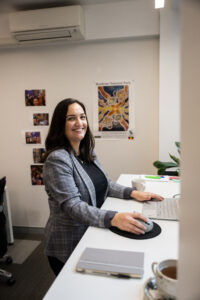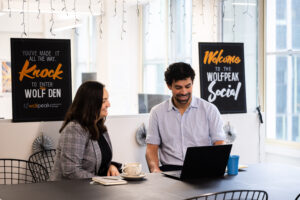Sustainability: A construction career: Ann Azzopardi
Setting the scene
The golden thread that runs through Ann Azzopardi’s career story is one of women supporting women.
At instrumental stages of Ann’s career, she has been “lifted up” by inspiring women – and now Ann is elevating the next generation of rising sustainability stars.
This series, developed by the Infrastructure Sustainability Council with the support of the NSW Government, aims to give Australian construction businesses insights and impetus to grow their workforce of female sustainability specialists.


From classroom to construction site
Today, Ann is the Sustainability Practice Lead at WolfPeak. Over her career she has influenced the sustainability outcomes on some of Australia’s largest infrastructure projects.
But when Ann was handed a list of careers in Year 9 and asked to pick three that appealed, sustainability was not something she’d considered. “Almost randomly, I chose accountant, chef and environmental scientist. This was the first time I’d even realised an environmental scientist was a career option.”
With aptitude for science and maths, Ann pursued a Bachelor of Science with Honours, majoring in environmental science and geography. “I was fascinated by the study of how humans interact with the natural world. Sustainability brings together both, so it makes a lot of sense that I ended up working in this space.”
Ann completed her honours year, weighing up a career in academia, but quickly realised it wasn’t for her. After attending a university careers day and applying for many graduate programs, she received several acceptances and opted for John Holland.
Breaking new ground
Ann’s first role with John Holland was as an environmental graduate on the Glenfield to Leppington Rail Line Project in Sydney. “I was out on site every day, getting my boots dirty, and my father would ask me why I had studied at university to come home from work every day covered in mud. But I loved it.”
 The male-dominated atmosphere on site was sometimes daunting, Ann admits. “I had been quite shy growing up, and I found myself in an environment that was very dirty, very masculine and very loud. It was confronting at first, but I quickly grew to love it. I felt part of something bigger and could see how my role mattered to the broader project. This built my confidence.”
The male-dominated atmosphere on site was sometimes daunting, Ann admits. “I had been quite shy growing up, and I found myself in an environment that was very dirty, very masculine and very loud. It was confronting at first, but I quickly grew to love it. I felt part of something bigger and could see how my role mattered to the broader project. This built my confidence.”
There were times when Ann faced unconscious bias, and times when the bias was front-and-centre. “Like most women working in this industry I’ve experienced prejudice and challenging behaviours, which can be difficult to navigate, especially when you’re young”
The most critical confidence builder in the early stages of Ann’s career, she says, was a female leader who saw her capability and gave her responsibility “even when I didn’t think I was ready”.
Dr Caitlin Richards was then an Approvals, Environment and Sustainability Manager at John Holland and had risen through the ranks working on some of Australia’s largest infrastructure projects. At the time, Caitlin was a senior leader in a joint venture team tendering for the North West Rail Link project (now Sydney Metro Northwest).
“Caitlin started her career at a time when it was very difficult for women to succeed in construction. When she was promoted to senior roles, she saw this as an opportunity to lift other women up. As a trailblazer, Caitlin paved the way for many other women to pursue positions of leadership and still be ourselves. She has also always been happy to devote time to assist women in updating their CVs, no matter how busy she is.”
20:20 tunnel vision
Ann worked alongside Caitlin with the winning tender team for North West Rail Link, learning very quickly about environmental approvals and being exposed to some very senior people in the industry. “This was one of the most enjoyable experiences in my career,” Ann reflects. “I grew in confidence, knowing I had this incredible female leader believing in me”.
But after following the project into delivery for another 12 months, Ann became burnt out. “I started to struggle with the early starts on site and regularly finding myself finishing late to stay on top of paperwork. The project was also about to start tunnelling, and that meant nighttime work.”
Sydney Water offered Ann an environmental scientist role, allowing a deeper dive into environmental approvals. “The regular office hours were also appealing, I’m not going to lie”, Ann admits. Leaving John Holland was difficult, but the nearly three years with Sydney Water were rewarding. “I learnt a lot about environment and planning legislation and being on the client side of projects. I gained different perspectives on the industry that have been invaluable.”
 The relationships you build during your career often bring unexpected opportunities, and soon Caitlin came calling with a new challenge – the $1.8 billion Sydney Metro City and Southwest Tunnel and Station Excavation works for a consortium which included John Holland, CPB Contractors, and Ghella. Caitlin wanted Ann to take on the Sustainability Manager role.
The relationships you build during your career often bring unexpected opportunities, and soon Caitlin came calling with a new challenge – the $1.8 billion Sydney Metro City and Southwest Tunnel and Station Excavation works for a consortium which included John Holland, CPB Contractors, and Ghella. Caitlin wanted Ann to take on the Sustainability Manager role.
“I felt like it was a big step forward in my career. I’d always been interested in sustainability management and had spent a lot of time talking to others in the field. It took a leap of faith, but I trusted Caitlin’s judgement and was on site two weeks later with a graduate of my own.”
That graduate was Cindy Liles. Together Ann and Cindy rolled up their sleeves and began leading the charge for sustainability, including preparing the IS Rating submission, for one of the largest infrastructure projects in Australia’s history. The major tunnelling and station excavation works included 15.5 kilometres of twin railway tunnels under Sydney Harbour, as well as the excavation for six new metro railway stations.
The project was subsequently awarded a ‘Leading’ IS Rating and a score of 100 – the highest score achieved at the time. “Cindy and I always joked about wanting to achieve a score of 100 – and much to our surprise, we did.” The project subsequently received the Outstanding Achievement in Infrastructure and Sustainability Award at the 2019 ISC conference. Among the project’s many achievements, it was the first to use an innovative tunnel boring machine assembly methodology which minimised resources, improved safety and reduced impacts on the community.
Collaborators come full circle
With the IS Rating for Design finalised and the project entering a new phase, Ann was approached by Tim Stubbs, Director of the environmental consultancy WolfPeak, who was on the hunt for talent. After careful consideration, Ann made the transition to consulting. “The hardest thing was leaving Cindy. But she was so clever, ambitious and hardworking, I could see her career continuing to grow with or without me,” Ann says.
Like Caitlin, Tim saw potential in Ann that she herself didn’t quite recognise. “Tim and our other Director, Steve Fermio, have been hugely supportive of me since I joined WolfPeak. They’ve given me the encouragement and space to gain my footing in consulting and build the sustainability arm of the business.”
Since joining WolfPeak, Ann has become Practice Lead for Sustainability and heads up a growing team of leading sustainability professionals – including “right-hand woman”, Cindy. As Ann says: “Everything has come full circle and I’m now in the privileged position to mentor and support the next generation of female leaders. And I’ll be forever grateful to those who have helped me get here.”
Lessons learnt
- Prioritise ‘people people’: Sustainability specialists need technical skills, but they also need to be adept at building relationships, Ann says. “The sustainability manager role is so all encompassing and holistic you need to be able to talk to and influence everyone across a project. Each role has its own jargon; you need to speak in their language and to adapt to your audience.”
- Play the long game: Construction teams grow and contract, and the careers of team members shift with the tides of their lives. “I’ve made hard career choices, but I’ve always worked with leaders who encouraged and supported those choices.” This support builds individual confidence, but also strengthens the network of female sustainability professionals working across the industry.
- Look beyond the ‘usual suspects’: “We need more people who are passionate about sustainability to enter the construction industry – and that means embracing diversity in all its forms,” Ann says. “More women, more neurodivergent people, more people from different ethnic and cultural backgrounds… Leadership can look different to what it has looked like in the past, but we need different thinkers to improve outcomes.”

